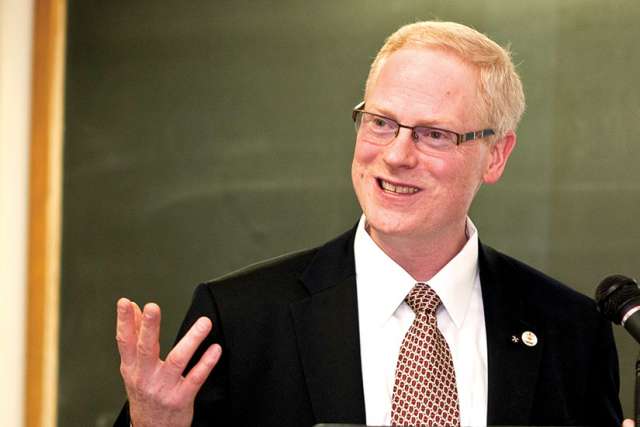Sullivan is the principal author of a new ethics guide for Canada’s family doctors that tackles the issues of assisted suicide and voluntary euthanasia. Published by the College of Physicians of Canada, the new “Guide for Reflection on Ethical Issues Concerning Assisted Suicide and Voluntary Euthanasia” is necessarily neutral on the change in the law mandated by the Supreme Court of Canada in a landmark decision last February. But there’s more to the issue than law, Sullivan told The Catholic Register.
“The key issue is that while this (Supreme Court decision) opens up all kinds of possibilities, it also makes it clear that physicians are going to be faced with a lot and they have to say more than just what the law says — which might have been what used to happen,” Sullivan said. “They’re going to have to engage in some deliberative process.”
While in the extreme instance it may be necessary for a doctor who morally objects to assisting in a suicide to transfer care of a patient to another doctor of the patient’s choosing, it’s never ideal to sever the relationship between doctor and patient. Instead, Sullivan hopes to see doctors engage in serious, respectful and deep conversations with their patients about end-of-life decisions.
When patients say they want to die, there’s a lot behind that statement. Before any decision becomes final, doctor and patient together need to explore the full background behind a desire to hasten death.
“The person who is making this request is already, in a sense, voicing a conclusion based on their perceived situation and maybe the very limited options that they perceive,” said Sullivan.
“Ethical deliberation between physician and patient should be specific and take into account the unique circumstances of each case,” reads the new guide for Canada’s family doctors. “The same standards of due diligence and care in ethical reasoning that pertain to the care of any patient should be maintained when physicians deliberate about the care of patients who have serious illnesses, diseases or disabilities and/or who are dying.”
But that kind of deliberation presumes a certain kind of doctorpatient relationship — one that takes time to establish and may be at odds with patient expectations.
There are many patients who still expect a paternalistic, doctorknows- best relationship and many doctors who comfortably slide into that role.
“The doc made the decisions and you just listened,” is how Sullivan describes this.
If this is what the patient expects from the doctor, then the patient may be unwilling or unprepared to engage in deep reflection on his or her values and hopes, or the reasons why death seems so inviting.
An almost opposite tendency also gets in the way of a serious reflection on the reasons behind a request for assisted suicide. Many doctor-patient relationships today follow a “consumerist model,” said Sullivan.
Like a shopper in a department store, in this model patients believe they’re in control — or that they’re supposed to be.
“You’ve got some goods and services and I’m the purchaser of those — that’s the sort of model that many people are familiar with,” said Sullivan.
But that model also stymies conversation. It just comes down to supply and demand. The only decision the doctor has to make is whether to stock assisted death behind the counter. Then the doctor has to determine whether the patient is a reasonably informed consumer.
Ideally doctors should know their patients and patients should know and trust their caregivers, said Sullivan. In that sort of relationship the truth of things and what’s best for everyone is arrived at slowly and together.
Doing more than just dispensing facts and responding to demands would push doctors into a deeper relationship with patients, “going beyond to actually walk with people in trying to make sense for them with this information.”
Sullivan calls this a “deliberative model” of the doctor-patient relationship.
He acknowledges that such a relationship demands a lot more of both doctors and patients. A conversation about death and all its consequences for those living who remain isn’t something that can be covered in an eight-minute consultation.
“Regardless of what the issue is, that is a level of involvement that I suspect doesn’t happen all that often,” Sullivan said. “And yet it’s something to be desired, I think, if physicians are good at helping people with that (end-oflife decisions) at least in the realm of medicine.”
By putting the euthanasia question in the context of the doctor-patient relationship, rather than just patient demand or patient autonomy, Sullivan believes doctors could practice better medicine generally.
“The whole focus at this stage in the debate is on the capacity of the patient who is making the decision. That’s sort of the legal context,” he said. “Right now at least, it all comes down to capacity.
It didn’t begin there necessarily in the dialogue in Canada. Capacity wasn’t the key issue. And I suspect it won’t end there. Already people are saying, ‘Well, what about advance directives, when a person is no longer capable?’ ”
Sullivan believes patients want doctors who think about the issues and share their insights.
“First of all, I think it’s a good thing that physicians have positions on some things,” he said. “If they come across something for which their conscience prevents them from following a request from a patient, then they should not be required to ignore that. There should be a provision that they’re not involved to a level that would violate their conscience.”


